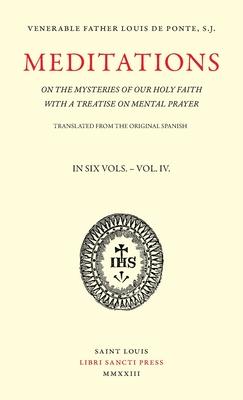"A complete course of Theology for the use of all Christians, where the art of prayer and meditation is taught theoretically and practically." - Fr. Camilo Mara Abad Puente S.J. (1878-1969)
Venerable Father Louis de Ponte, S.J. lived to be one of the most esteemed ascetical writers of the sixteenth and seventeenth centuries. He was born in Valladolid Spain, on 1554. He died a holy death in the same city on the 16th of February 1624, having completed his seventieth year. His cause of beatification was introduced in 1667; all his writings pontifically approved in 1714; and his virtues declared heroic in 1759 by Clement XIII. He spent a great part of his priestly life exclusively devoted to the spiritual formation of younger Jesuits, either as master of novices or as spiritual father. Through his personal experience of labouring in the lord's vineyard, he learned how to direct souls. Leading them in prayer and showing them how to seek God.
His first work which issued from his pen was the book of "Meditations" on the principal mysteries of our holy faith, on the Life and Passion of our Lord, of His Blessed Mother, of the Divinity and Trinity etc. It was written in Spanish, and printed in the year 1605. Within one year after its first appearance, it passed through three editions, and was translated into seven languages.
It is in truth an immortal work, in which the reader scarcely knows which to admire most, either the extensive learning, or the order of arrangement, or the multiplicity and correctness of the reflections, or the unction with which the mysteries are unfolded. It cannot be read without feeling the will excited to devotion, or without a desire to profit by it. In it he explains admirably the practice of prayer, at the same time furnishing ample materials for it. In it directors and confessors may find wherewith to instruct those committed to their charge. In it religious of every order may find celestial manna for the daily food of their devotion. In it, in fine, every person of every state may learn how to appreciate the eternal truths, and the mysteries of our holy faith, and also how to live well, if they will frequently read and meditate upon them. Emperor Ferdinand II declared that this book had been most useful to him, and knew it almost by heart.
